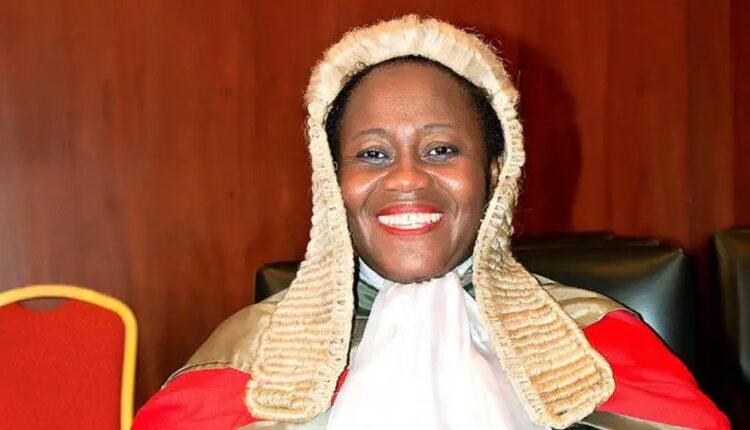The road is smoothly clear now for Supreme Court judge, Her Ladyship, Justice Gertrude Torkornoo, to become the 15th Chief Justice of the Republic of Ghana after the Minority Caucus on the Appointment Committee of Parliament officially stated its approval for her nomination through a press statement on Tuesday.
“…We the members of the Appointments Committee representing the National Democratic Congress (NDC) will not withhold our approval of the Chief Justice nominee by consensus. Her curriculum vitae reveals a person of considerable experience having served as a judge from the High Court to the Court of Appeal and ultimately at the Supreme Court. Women who have acquitted themselves should be given opportunities to occupy key national offices. Even as we disagree with her jurisprudence, we find her qualified to occupy the high office of Chief Justice of the Republic of Ghana”, the group noted in press statement signed on Tuesday by Governs Kwame Agbodza, the Deputy Ranking Member of the Appointments Committee and the Minority Chief Whip.
The Minority statement noted: “the image of the judiciary is not in a good shape. Several opinion polls show that. We hope that Justice Gertrude, as a lady Chief Justice, will restore the dignity of the judiciary.”
“The Minority Caucus had initially threatened to withdraw its consensus for the approval of Justice Torkonoo over misgivings the side had regarding the judgment the Supreme Court delivered to expunge the name of James Gyakye Quayson from the records of Parliament after his eligibility as MP for Assin North was challenged in court.
The Tuesday statement which announced the Minority’s approval of Justice Torkornoo expressed in very clear terms its disagreement with the ruling the Supreme Court made on James Gyakye Quayson
The statement noted: “The nominee for post of Chief Justice (Justice Gertrude Araba Essaba Torkornoo) told the whole world that she is a textualist in her preferred approach to interpreting the Constitution of Ghana 1992.
“What was the text in dispute in the case of Michael Ankomah Nimfah Vs James Gyakye Quayson and Others? This is the famous James Gyakye Quayson case. The text in dispute is article 94 (2) (a) of the 1992 Constitution and it reads;
“94(2) A person shall not be qualified to be a member of Parliament if he (a) owes allegiance to a country other than Ghana”
“The facts of the case, not disputed at any time, are that Quayson, at the time of being sworn in to become a Member of Parliament, had successfully renounced all allegiances to any other country and his allegiance was to only the Republic of Ghana.
“Fidelity to the text of the constitution of Ghana would have dictated that the
controlling provisions in the resolution of the dispute are the words “qualified to
be a member of Parliament”.
“Disappointingly, a professed textualist like our CJ nominee abandoned the text and chose to read into the text a replacement text “qualified to file nomination papers to contest for election as a member of Parliament. This is exactly why the NDC Minority Members of Parliament on the Appointments Committee wanted to wait for the reasoning to see if the CJ nominee, Justice Gertrude Araba Essaba Torkornoo, would be true to her publicly professed textualist approach to constitutional interpretation.
“Whilst the clear language of the Constitution was dealing with qualification “to
be a Member of Parliament”, the Supreme Court veered off and was dealing with “eligibility or qualification of a person to contest as a Member of Parliament”. Article 94 is not talking about eligibility to contest elections. it is about becoming a member of parliament. This only takes place at the point of swearing-in.
“Instead of fidelity to the text of the Constitution, which the CJ nominee professed as her preferred approach to constitutional interpretation, she succumbed to what we believe was a flawed precedent set earlier by the Supreme Court in Ex Parte Zanetor. Republic v. High Court (General Jurisdiction), Accra; Ex Parte Zanetor Rawlings (Ashittey and National Democratic Congress Interested Parties) (No 2) (2015-2016) 1SCGLR 92, which this current court relied on, was wrongly decided by an earlier panel of the Supreme Court. Zanetor would have been qualified anyway if the Supreme Court was to conclude that article 94 deals with qualification “to be a member of parliament” and not eligibility “to contest elections to be a member of parliament” which was what was in issue in the Zanetor case.
“Even if we admit that there should be some house keeping matters at the point of filing nomination papers, that should be the appropriate province of legislation and not judicial enactment.”


Comments are closed.